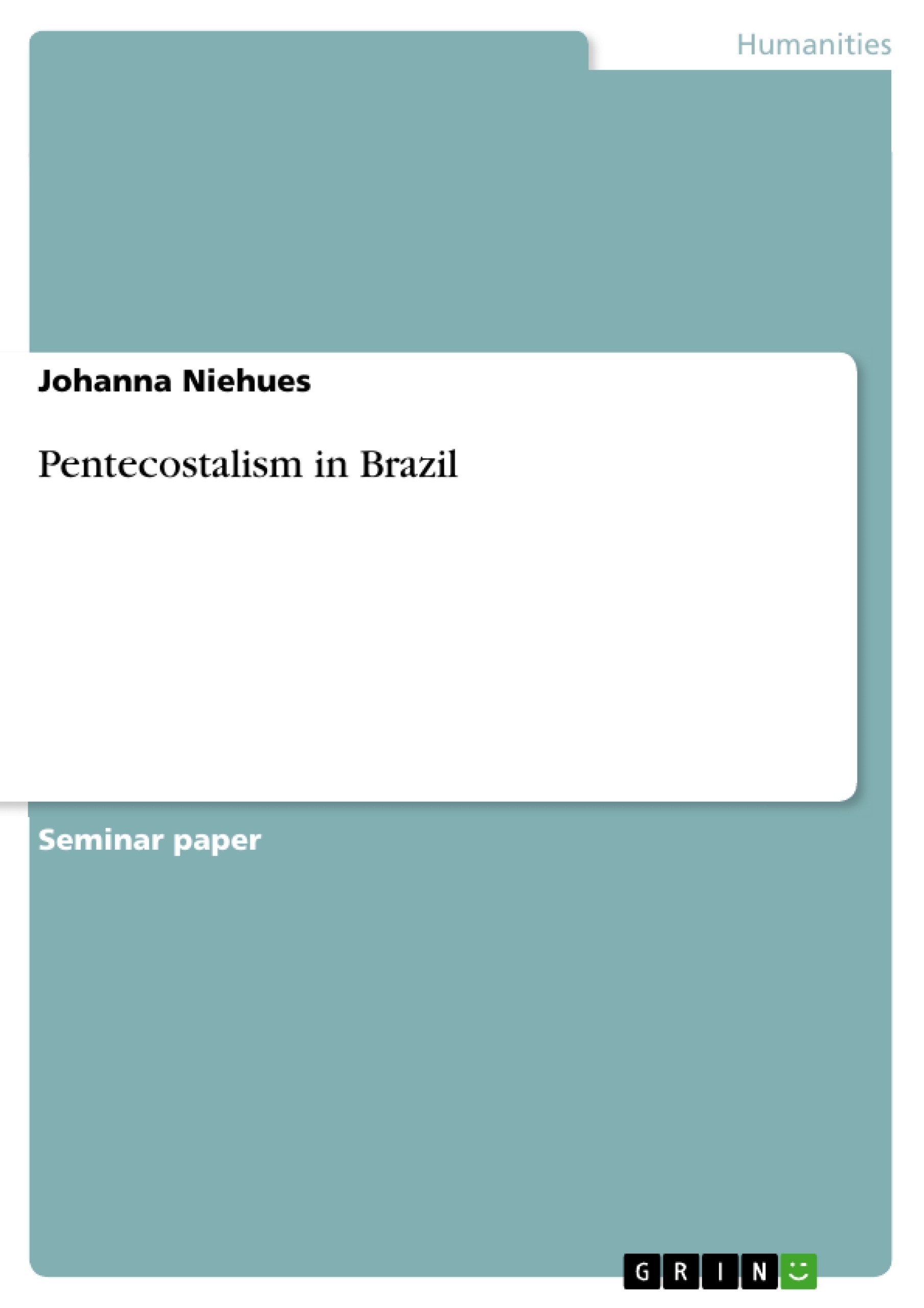The focus of this research essay is on the emergence, development and public appeal of Pentecostalism in Brazil. First of all, the history of the Pentecostal churches in Brazil and their expansion within the last several decades will be examined. Thereby attention will be drawn to the wider social and global circumstances that enabled the religious change in Brazil.
In a second step the increase of differing types of Pentecostal churches will be assessed. By comparing it to having a deregulated market situation it will be exemplified how various products, in this case types of churches, are fighting for consumers and account for niche marketing in a situation of religious competition.
Finally, the circumstances of the Brazilians that are mainly attending Pentecostal churches will be illustrated with focusing on the benefits and appeals of committing to Pentecostalism. By applying aspects of the rational choice theory it will be examined why people and levels of society are drawn to specific churches in opposition to others. In particular, attention will be given to the attractiveness of the Universal Church of the Kingdom of God to a particular group of society thereby stressing the demand side of the relationship.
Inhaltsverzeichnis (Table of Contents)
- The Emergence and Development of Pentecostalism in Brazil
- From US Missions to an “Autonomous Autochthonous Initiative”
- Pentecostalism's Growth in Brazil and its Social Context
- Waves of Pentecostal Growth
- The First Wave: 1910/1911
- The Second Wave: 1950s and early 1960s
- The Third Wave: 1980s
- Pentecostal Churches and their Diverse Practices and Ethics
- The Market Approach to Religion
- The Attractiveness of Pentecostalism for Specific Groups
Zielsetzung und Themenschwerpunkte (Objectives and Key Themes)
This research essay examines the emergence, development, and public appeal of Pentecostalism in Brazil. It investigates the historical roots of the movement, its rapid growth in recent decades, and the factors contributing to its popularity. The essay also analyzes the diverse types of Pentecostal churches, their distinctive practices and doctrines, and how they cater to specific societal needs.
- The emergence and growth of Pentecostalism in Brazil
- The social and global context surrounding Pentecostalism's development
- The diversity of Pentecostal churches and their practices
- The marketing and economic approach to understanding Pentecostalism
- The specific appeals of Pentecostalism to different groups in Brazilian society
Zusammenfassung der Kapitel (Chapter Summaries)
The essay begins by tracing the origins of Pentecostalism in Brazil back to its roots in the United States at the beginning of the twentieth century. While acknowledging the influence of US missionaries, the author highlights the key role of “autonomous autochthonous initiatives” in driving the movement's growth. The essay then explores the various waves of Pentecostal growth in Brazil, emphasizing the distinct societal and global circumstances that fueled each wave. The first wave, characterized by traditional Pentecostalism, emerged in 1910/1911, while the second wave, marked by a more dynamic engagement with society, began in the 1950s and early 1960s. The third wave, which took root in the 1980s, is distinguished by the rise of neo-Pentecostal churches and their emphasis on spiritual warfare and prosperity theology.
Further exploring the diverse landscape of Pentecostal churches, the essay discusses the distinct ethics and practices adopted by each wave of the movement. The author notes that while the first wave emphasized speaking in tongues, the second wave highlighted divine healing, and the third wave prioritizes spiritual warfare and prosperity theology. The essay moves on to delve into the marketing and economic approach to understanding Pentecostalism, highlighting the influence of shifting supply rather than shifting demand in shaping the religious landscape. It then analyzes the specific appeals of Pentecostalism to different groups in Brazilian society, emphasizing the particular attractions of certain churches to women and the poor.
Schlüsselwörter (Keywords)
The key terms and focus topics of this research essay include: Pentecostalism, Brazil, religious change, social context, global influences, church diversity, practices and ethics, marketing, economics, consumer needs, rational choice theory, and societal appeals.
Frequently Asked Questions
How did Pentecostalism begin in Brazil?
Pentecostalism in Brazil originated from US missions in the early 20th century but grew significantly through "autonomous autochthonous initiatives" led by Brazilians themselves.
What are the three waves of Pentecostal growth in Brazil?
The first wave began in 1910/1911 (traditional), the second in the 1950s/60s (focused on divine healing), and the third in the 1980s (neo-Pentecostalism, spiritual warfare, and prosperity theology).
What is the "market approach" to religion mentioned in the essay?
The market approach views the religious landscape as a deregulated market where different churches compete for "consumers" (believers) by offering specific "products" or spiritual benefits.
Why is Pentecostalism attractive to specific social groups in Brazil?
It offers specific ethical frameworks and spiritual support that appeal particularly to women and the poor, addressing their unique social and economic challenges.
What is the role of the Universal Church of the Kingdom of God?
The essay highlights this church as a key example of the third wave, showing high attractiveness to certain societal groups due to its focus on prosperity and spiritual warfare.
- Quote paper
- Johanna Niehues (Author), 2005, Pentecostalism in Brazil, Munich, GRIN Verlag, https://www.grin.com/document/144439



